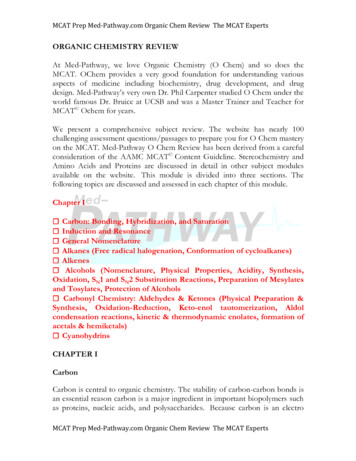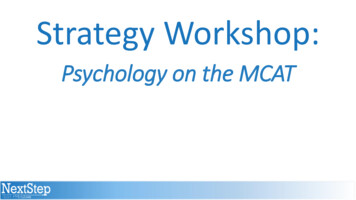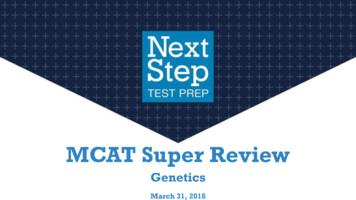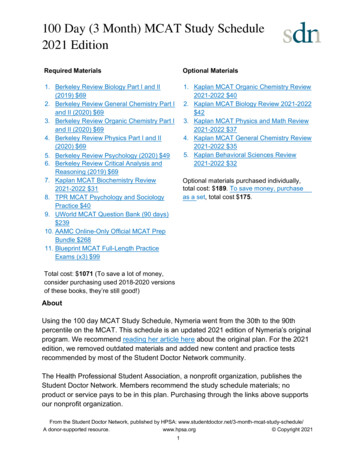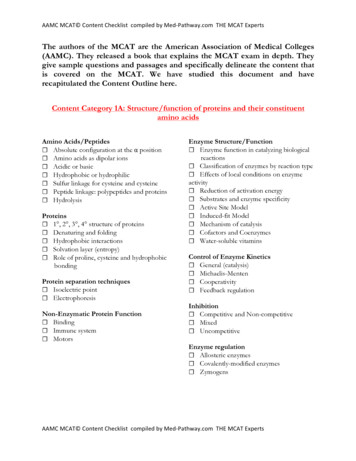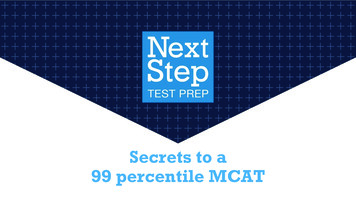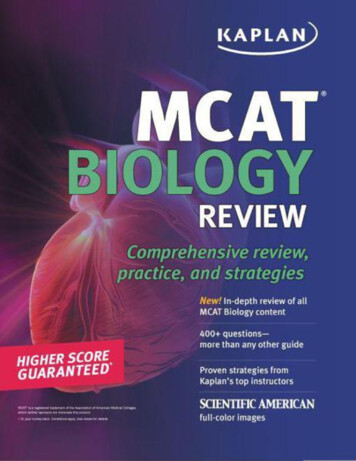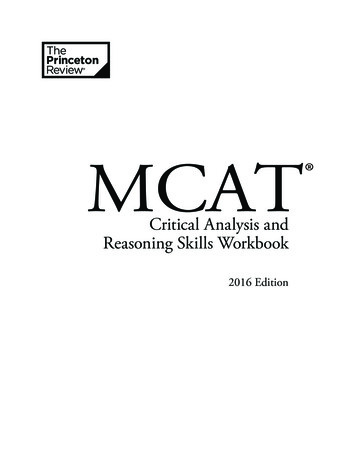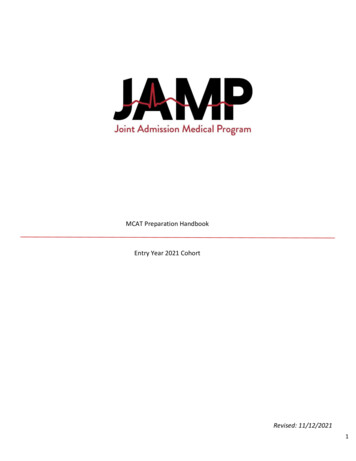
Transcription
MCAT Preparation HandbookEntry Year 2021 CohortRevised: 11/12/20211
MCAT Preparation Handbook1JAMP Expectations . 3Structure . 3Testing Requirements . 3Attendance . 3Required Tests/Exams & Coursework . 4MCAT Registration . 4Paying for the MCAT . 4Fee Assistance Program (FAP) . 4Why is this Important? . 5How to Access Your Kaplan Online Study Plan . 6Logging in to Kaptest.com . 6Kaplan Test Prep Resources. 7Online Resources and Exams . 8Class Preparation . 12Accessing Live Class Sessions . 13Your Schedule Design . 13Placement Quizzes . 14Activity Library . 14MCAT Workshops . 14AAMC Resources . 14Reading Effectively . 14Your Qbank . 15How to Use the Qbank . 15Customize . 15Review . 16Improve . 16How to Use Your MCAT Flashcards . 17Wisdom from JAMP Medical School Students . 19Your Resources . 202
MCAT Preparation HandbookThe Medical College Admission Test (MCAT) is an important standardized aspect of assessing your readinessfor medical school. For many students, the MCAT can be the make-or-break point for entering medical school.To achieve a respectable score, you will have to learn to combine MCAT strategy with content mastery.It is thoroughly important that you take heed to the test taking strategies you will learn in the coming months.The MCAT is the first of a series of examinations you’ll take throughout your medical career; the next set willbe the United States Medical Licensing Examination Steps 1, 2, and 3, which will allow you to apply for amedical license. You will encounter this next set of standardized exams following your second year in medicalschool.JAMP ExpectationsStructureThe MCAT prep is broken into 3 Phases each aimed at providing you the necessary practice and structure toadequately prepare you for the MCAT. These three phases are: Phase 1:o CARS Foundations Phase 2:o Biology Enrichmento Chemistry Enrichment Phase 3:o Live Online ClassesTesting RequirementsJAMP participants must take the MCAT by the specified test date in April 2021*. The minimum MCAT scorethat must be achieved to qualify for Medical School will be a total score of 502 with no section score less than124. Participants who fail to meet this requirement may be dismissed from the program.JAMP requires you to take the MCAT by the specified test date in April 2021*.*Warning: The JAMP council may elect to require all eligible JAMPers to take the mid‐April MCAT exam orearlier.AttendanceClass attendance, participation and completion of related assignments is required. It is not enough to showup! You must also participate!If you have a conflict with any given class, you must email Dr. Joel Robles at jrobles@texasjamp.org andyour JAMP Faculty Director (JFD) in as far advance as possible for consideration of an excused absence.If you become ill and are unable to login for the class, an email must be sent immediately explaining the situation.Unexcused absences will be followed up with a request for an explanation to be sent to Dr. Joel Robles(jrobles@texasjamp.org) and your JFD. Records of these absences will be kept and reported to the JAMP Council for3
future consideration.JAMP Expectations cont.Required Tests/Exams & CourseworkThroughout each phase of the MCAT prep program, pre work, post work and full-length exams will be taken tomeasure your knowledge. The completion of this work and exams is required to be completed with establisheddeadlines.MCAT RegistrationYou are solely responsible for registering for the MCAT.Paying for the MCATPlease view the AAMC’s MCAT page for all info pertaining to the exam. You can find it �mcat‐examFee: 320This summer you were advised to save some of your summer stipend to pay for the MCAT. Whenregistration opens, it will be crucial to have the money ready to pay for the exam when you are informed todo so to ensure you are able to get into the location and date of preference.Registration: The latest news indicates that registration for the 2021 MCAT will take place in late October2021. JAMP will notify you when registration opens and provide a deadline by which you need to register.However, it is primarily your responsibility to seek out this information. Openings fill up very quickly atcertain sites in Dallas, Houston, San Antonio, and Austin as well as neighboring states, so make sure you areready to register quickly.Fee Assistance Program (FAP)You may qualify to have your fee reduced from 320 to 130.When you are approved for the Fee Assistance Program, the approval will count toward registration for examsduring that calendar year. FAP approval is not retroactive; you must receive the FAP approval prior toregistering for the MCAT.Once all documentation is received, you should be notified of the outcome of your Fee Assistance ProgramApplication within 15 business days.For more information about FAP, visit: https://www.aamc.org/students/applying/fap/.4
Why is this Important?The opportunities JAMP offers you are unparalleled, but to ensure that you are competitive enough for yourtop‐choice medical school, your MCAT score should properly reflect the effort you’ve put into preparation formedical school.We find it beneficial to see how current medical school applicants / matriculants fare to help you calibrate yourperformance to be more competitive for the JAMP Match.Below are the average MCAT section scores for the medical school class of 2018.Medical School Entry Year 2018Average CPBSMatriculatedTMDSAS Schools* 127.5Average CARS Average BBFLMatriculated MatriculatedAverage PSBBMatriculated126.8127.9127.7*Includes the U.T. System Medical Schools, Texas A&M College of Medicine, TexasTech School of Medicine, TTUHSC Paul L. Foster SOM and UNT‐Texas College ofOsteopathic Medicine.Source: dEY18.pdf5
How to Access Your Kaplan Online Study PlanLogging in to Kaptest.comGo to www.kaptest.com/loginLogin with your email address and password.If you don’t know your Kaptest.com account password, click “Forgot your password” to receive a passwordreset email.**If you are having difficulty logging in, please reach out to KPS Service@Kaplan.com**6
Kaplan Test Prep ResourcesAfter logging in, you should be at the following screen. Please note, the courses you are enrolled in may bedifferent than what is pictured below.Click on the “Access Resources” link under the appropriate section in order to access class materials.7
Online Resources and ExamsPortions of the MCAT preparation program may require you to complete a Pre-Test for CARS course and aBaseline Exam for the MCAT course (indicated below).These tests must be completed by the due dates provided and can be accessed within the “Online Resources”section of the courses.Take full advantage of the class resources provided to you at all times! You have access to a wealth ofinformation designed to help you be successful.First StepsThe first time you access your Kaplan resources for the MCAT course, you will be asked a series of questions that willbe used to automatically create your study schedule.Questions 1 and 2:For question 1, you should enter your actual MCAT test date. If you have not registered for the MCAT, then youshould enter the last day of the month in which you plan on testing.For question 2, enter the approximate number of hours you expect to spend studying for the MCAT each week.8
Question 3:This one is going to take a little more effort but is still relatively easy. Block off any days you will not be able to study.This should include periods of time through the school year which you know you will not be able to dedicate time tothe MCAT like midterms and finals periods. Also, be sure to include planned holidays and obligations and at leastone rest day off per week. You will need to scroll through the calendar until your test date.Once you click submit, your study calendar will be generated. This may take a few moments, but rest assured thesystem is doing its work. Click continue, and your personalized schedule will appear.Once you see your personalized schedule, you will want to become familiar with the resources in your course. Thefirst “assignment” listed will be “Get Started Here.”9
The resources listed under the “Get Started Here” assignment will orient you to the various resources that are partof your course. The “How Your Course Works” video is full of valuable information that will explain the design of ourMCAT program and how all the components work together. Be sure to complete this entire assignmentimmediately!10
You will follow your schedule throughout your MCAT preparation – it is personalized to you and will populate yourassignments in a pragmatic manner.Baseline ExamThe MCAT Baseline exam can be found in your calendar, it will be the second assignment you see. It willsay “Establish Your Baseline.” This is AAMC full length exam #1 and will mimic the official MCAT inlength, question content and difficulty. It will take you 7.5 hours to complete.There are several reasons we would want you starting off with a full-length exam right out of the gate.The first is that it sets a baseline for your studies — it allows you to diagnose your areas of opportunityto be able to study most efficiently which is the name of the game when you're trying to fit somewherein 300 hours of studying into your schedule.Taking an AAMC exam as you begin your prep also allows you to get exposure to the way the test makerwrites questions. The MCAT is unlike the exams most people take during their undergraduate studies. Itis a passage-based exam that requires content knowledge and critical thinking skills - we want you tostart practicing those skills right away.The best way to approach this test is without preparation and in the most test-like way possible meaningyou'll want to take all of the sections in one sitting sequentially. Use a mouse (not a trackpad) on thecomputer, if possible.You will need to complete this assignment by January 3rd, 2022, before your first-class session.Once you select “Establish Your Baseline,” you will see this screen. You will need to click the launchbutton to take you to the exam.Full‐Length Tests and Test Review12 Kaplan Full‐length tests and 4 AAMC exams are available. The minimum required number of full‐lengthtests have been scheduled and you should complete each one by the required deadline.Test Review is an important part of your course. This provides you with crucial feedback on both yourstrengths and weaknesses so that you can both see your progress and focus your prep on your areas ofopportunity.11
Class PreparationBefore each class session, there are going to be various assignments that you will need to complete. Thesecan be found by clicking on the live session name. You will want to complete these assignments to get themost out of your live class sessions. Be sure to complete the Live Class Prerequisites before your liveinstruction begins as well.12
Accessing Live Class SessionsYour live class sessions can be accessed directly in your schedule. Live classes are marked “Live Class” and willappear like this:You can access the live session by clicking on the title of the session. You can also add the live sessions to yourpersonal calendar.After Class WorkAfter each live class session, you will want to continue to access your schedule to complete the assignments thathave been personalized for your study plan.Your Schedule DesignYour course comes with a wealth of resources, each serving a specific purpose. Here we explain the underlyinglearning science principles that have guided the development of this course.Research has shown—and everyday experiences support—the idea that repeated exposure leads to increasedfamiliarity and memory. That's the idea of spaced repetition, but here's the kicker: if you're going to see the contentagain, you don't need to focus on it as intently the first time you see it. That extra early effort does not pay off ifthere are going to be subsequent exposures. Your course is built around spaced repetition of the highest yieldconcepts on the MCAT. So the takeaway is that you should start at the beginning and keep moving forward,knowing that you'll see the content again and again.Of course, there are nuanced ways to present the content. Learning science has shown that mixing up your studies,say by going from biology to biochemistry to general chemistry, is more efficient than simply focusing on a singlesubject until completion and then moving on. So you'll notice that we weave through the various disciplines on theMCAT.The first pass at the high-yield content is what we call "content refreshers." Here the focus is a quick overview of thehighest yield topics with the goal of building foundational knowledge and understanding. These lessons prepare youto answer Skill 1 type questions on the MCAT.The second pass through the content involves using the content to answer questions—this is what we call"application." In this phase you'll see the same content again, but the content is presented in a way that helpsprepare you to answer higher-order questions on the MCAT.The third pass through the content is called "topical review." The Subject Review Notes form the core of this phase,and therefore include all of the content that could possibly be tested on the MCAT. They are emphasized at thisstage so that you can read them efficiently. By this point you've seen the high-yield content and have been exposedto test like resources. Use that information—and the Placement Quizzes—to help streamline your review.13
The last phase of your preparation is "simulation." This is where the strategy and content come together inincreasingly more test-like practice.Placement QuizzesYour course breaks up large subject areas into smaller chunks. One major advantage is that we can provide targetedassessments and provide personalized recommendations, for example, to either skip some instructionalcomponents or spend more time reviewing them. That's the goal of our Placement Quizzes. Score well enough (thethreshold varies based on the content) and move on! Otherwise complete the subsequent assignments beforetaking a Review Quiz.Even though the Placement and Review quizzes cover the same content as the corresponding videos, you maynotice that the quizzes require more than recall of facts. That's because the quizzes are designed to demonstrate therequirements of the MCAT. Skill 1 questions will require you to think critically about the basic sciences. So forexample, you might need to recognize familiar content in unfamiliar contexts.Activity LibraryYour course has over 500 hours of material! But rest assured we don't expect you to complete every singleassignment. Your Schedule shows the activities that will maximize the amount of study time you have available. TheActivity Library contains all of the activities in your MCAT course. At any time you can search or browse by type orstatus. Common searches and their function are described below: Search "How to" (filter by "reading") to bring up articles that explain how to use your Kaplan Resources.Search "AAMC" to bring up your AAMC resources.Search "Lesson on demand" to bring up recordings of your live sessions.Search any chapter title, such as "The Cell", to bring up the chapter review document that outlines all theresources specific to that chapter.Search "Chapter Review" to bring up all 72 science chapter documents which outline all resources.Search “Kaplan Full-Length” to bring up all 11 Kaplan Full-Length exams.MCAT WorkshopsYour MCAT Workshops are live versions of your application lessons. They contain more than 90 one-hour sessionsthat go in depth on important MCAT topics. These sessions cover both content and strategy and should be used toboost your understanding of any content areas in which you need some extra help.AAMC ResourcesAll of the official AAMC resources are included in your Kaplan course! We have strategically placed assignments onyour schedule, but you can access all of them at any time by searching your Library for "AAMC."Reading EffectivelyYour course comes with the Subject Review Notes books, which cover every topic on the MCAT, but don't think thatyou must read these cover-to-cover. Instead, once you decide to review a chapter, start with the Science Mastery14
Assessment. Note any topics covered in questions you got wrong and focus your reading on sections that cover thatmaterial. It is not worth your time, at least to start, to review concepts that you’re already familiar with. When youdo read a section, make sure to stop periodically as you go along and summarize what you’ve read, either mentallyor in the form of notes. Always try to think about how the material you’re reading connects to other MCAT topicsyou’ve learned about; doing so will aid understanding and recall. Finally, be sure to complete the Concept Check atthe end of the section to ensure that you’ve gleaned the most important material from that section.Your QbankThe absolute best way to ensure that you’re prepared for the MCAT is to practice answering multiple-choicequestions. Often, it’s not practical to sit down to take a full-length test or even just a section, and often you’ll wantto target content that you’ve recently studied. Your QBank allows you to create quizzes that drill down to specifictopics and subtopics. Want to try a ten-question quiz on Compounds and Stoichiometry? You got it. Review yourresults with complete answers and explanations.How to Use the QbankCustomize3,000 MCAT-style questions are at your fingertips. Create customized quizzes to strengthen weak areas, sharpenskills, and work on pacing and endurance. You may notice that each topic corresponds to a book, and each subtopica chapter, from our 7-Book Subject Review Notes—which makes the Qbank the perfect book companion.15
ReviewBe sure to review every question. Use the Step-By-Step explanations to learn how to attack questions like an MCATexpert.Use Summary explanations to quickly check your understanding, and when necessary take a deeper dive into thecontent with In-Depth explanations.ImproveEarly in your studies you should create short, untimed quizzes focused on specific areas: read about a topic thencreate a quiz to ensure your understanding. As test day nears, create longer, timed tests to build pacing andendurance. To simulate a section of the MCAT, create quizzes with multiple topics, and be sure to reviewexplanations and your Performance page to stay on track.Scientific AmericanAs part of our partnership with Scientific American, you have the opportunity to receive a complimentary ScientificAmerican digital subscription for six months. This special subscription includes six digital issues and four-year rollingdigital archive access. Access Your SubscriptionScientific American is the essential guide to the modern world for science enthusiasts everywhere, and itsauthoritative articles are a great resource to practice critical reading skills when preparing for the MCAT.16
Digital FlashcardsHow to Use Your MCAT FlashcardsWe recommend starting to use the flashcards as soon as you have started reviewing content so you can reinforcethose scientific concepts.These flashcards use spaced repetition to encourage efficient and effective learning. Learning science demonstratesthat reviewing content periodically helps reinforce your memory of that content, a phenomenon known asthe spacing effect. Spaced repetition takes advantage of the spacing effect by serving up flashcards periodically. Inspaced repetition, cards you struggle with are shown more frequently, while cards you have mastered are stillshown periodically but with less frequency. Your input determines the frequency with which cards reappear. Themodel for this tool was Anki flashcards. These flashcards look, feel and function similarly to Anki decks. Notethat mobile devices will work with the flashcards and stay synced with web usage.Starting a Session: To start a study session, simply click the Study Now button. You will be shown cards until thecards for the day have run out. We introduce 20 new cards per topic each day. This batch size is recommended bylearning science as the best way to master this type of material.17
During a Session: You will be presented with a prompt. When you feel ready, click Show Answer to see thecorresponding answer or definition.In addition to the answer or definition, you will have three, sometimes four, options. Again will bring the card backup in 1 minute. Good will bring the card back up in 10 minutes. Easy means you’ve mastered the card, and we won’tshow it to you again today. Once a card has been shown a number of times over several study sessions, a newoption will become available. Hard will bring the card back less often than if you had chosen Again, but more oftenthan if you had chosen Good.Reviewing Your Sessions: Your stats are available by clicking Show More Stats. You will see a chart showing thenumber of cards you have mastered versus those you are still practicing or are still unseen. You will also see abreakdown of the responses you’ve chosen for cards (Easy, Good, Hard, Again) and a history of your card usageover time.18
Questions for Kaplan?Please don’t hesitate to reach out if you have any questions.In‐Class Chat questions to your instructors before, during, or after class.By Email Email your instructors if you have questions about content, structure, strategies. Email the KaplanService Team at KPS Service@Kaplan.com with other questions or concerns.By Phone For Technical Support call 1‐800‐KAP‐TEST.Wisdom from JAMP Medical School StudentsPlease do not procrastinate with your MCAT preparation! In time, that will catch up with you and will leaveyou overwhelmed and pressed for time.Some modules will take longer to complete than others. This is all very manageable if you stay on top of it. Beproactive and work through the assignments with purpose.Do not sabotage yourself and allow a recording to play through muted so it checks off, or complete a quizquickly for completion without effort, or sign into your live online class and not participate. This will only serveto be a detriment when you take full length exams and certainly on the actual exam.It is not wise to purposefully perform poorly on the exam. This score will be reported by AAMC for severalyears and will be accessible to medical school admissions officers for all future score reports.Get your practice in! The number of full‐length exams scheduled is the bare minimum. SuccessfulJAMPers take as many Full‐Length Practice Exams as possible!19
Your ResourcesIf you have any technical issues, please contact KapTest Tech Support at 1‐800‐KAP‐TEST or atcustomer.care@kaplan.com.If you have any questions or issues regarding any of your Kaplan Resources, please contact the InstitutionalService Team, Kaplan Partner Solutions at KPS Service@Kaplan.com.For any JAMP‐related questions, absence notifications, or any other issues, please call Dr. Joel Robles,Associate Director at the Joint Admission Medical Program office at (512) 499‐4352, or atjrobles@texasjamp.org.20
Joint Admission Medical Program
Nov 12, 2021 · Baseline Exam The MCAT Baseline exam can be found in your calendar, it will be the second assignment you see. It will say “Establish Your aseline.” This is AAMC full length exam #1 and will mimic the official MCAT in length, question content
